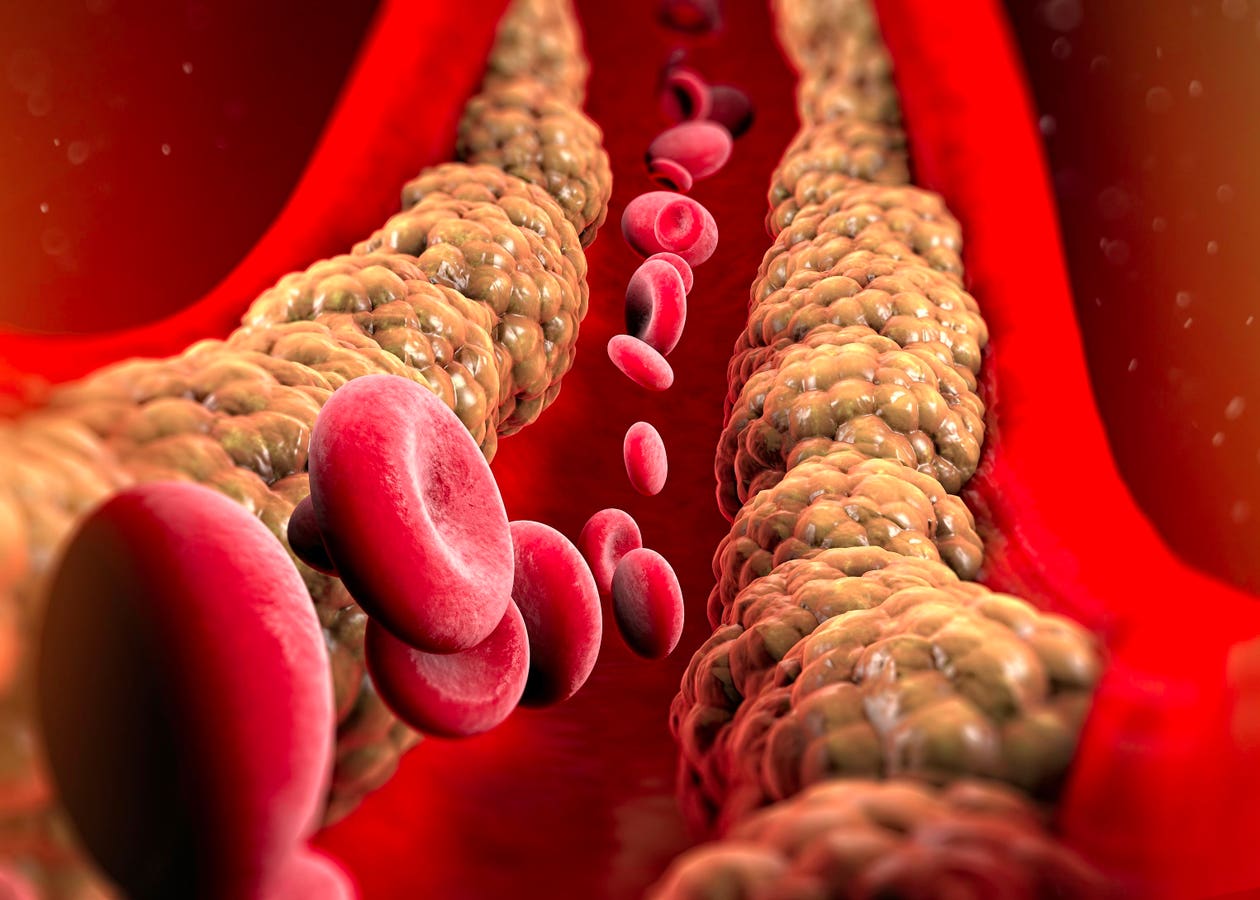If you have elevated levels of “bad cholesterol” and are at greater risk for having a heart attack or stroke, it’s common for doctors to start you on a statin. But what if you are on a statin island, so to speak, and among the 15% or so of people who can’t tolerate being on such an anti-cholesterol medications? Well, you may want to take to heart what a clinical trial just revealed about bempedoic acid, a potential alternative to statins. In this “acid test” of a trial, those who took bempedoic acid once a day had on average a 30.2 mg/dL or 21.3% reduction in low-density lipoprotein (LDL) cholesterol levels over about a three-year period, as described by a June 24 publication in JAMA.
Plus, compared to those who took placebo, those taking bempedoic acid were also 39% less likely to suffer heart attacks, 39% less likely to die from heart disease, and 36% less likely to die of either a heart attack or a stroke. That’s encouraging news for those with statin intolerance. But take all of these results with a grain of salt—figuratively, of course, and not literally because too much salt isn’t good for your cardiovascular system. It is only one study. And one study is, you know, just one study.
Now, statin intolerance is not when you insult and bully statins. Rather, it’s when you can’t continue taking statins like atorvastatin (which is the generic name for Lipitor), rosuvastatin (Crestor) or simvastatin (Zocor) due to significant side effects from the medication. Most commonly, what may happen with muscles is what will pull the use statins. Some people may develop muscle aches, pains, weakness, or cramps that become intolerable or an elevation in the blood levels of creatine kinase, which is a marker for muscle injury. Another reason for stopping a statin is when blood tests show elevations in liver enzymes that suggest that some kind of liver injury may be occurring.
Statin intolerance can be a real barrier to lowering elevated LDL levels. LDL is not an LOL type of cholesterol. It’s the bad kind of cholesterol that can clog up arteries that are supposed to supply blood to your heart and brain, arguably two of your three most important body parts, depending on where you happen to rank your genitals. When your LDL is elevated, doctors will usually first suggest lifestyle changes such as reducing the amount of saturated fat that you consume, eating foods rich in omega-3 fatty acids, increasing your fiber intake, adding whey protein to your diet, cutting down your 19-hot-dogs-a-day diet, increasing your physical activity, trying to lose weight, quitting smoking and reducing your alcohol intake.
When you’ve made “whey” too many unsuccessful lifestyle modification attempts, doctors often will prescribe statins to help “de liver” lower cholesterol. Statins work by inhibiting HMG-CoA reductase, an enzyme that the liver uses to manufacture cholesterol. Statins can also help your liver remove cholesterol from the blood and reduce inflammation in your artery walls. Studies have shown that for each 1.0-mmol/L (39-mg/dL) reduction in LDL achieved by statin use, the risk of major cardiovascular problems can drop by 20% to 25%, as determined by a meta-analysis published in The Lancet.
Bempedoic acid is an intriguing alternative for those with statin intolerance. In early 2020, the U.S. Food and Drug Administration (FDA) granted approval to Esperion Therapeutics, Inc, to market their version of bempedoic acid called Nexletor. That made oral history, so to speak, as it was the first oral, non-statin, LDL-lowering medication to earn such approval since 2002. This medication can reduce the amount of cholesterol made by your liver via a somewhat different mechanism. It inhibits a different enzyme, adenosine triphosphate-citrate lyase (ACL), that works earlier in your liver’s cholesterol making process. Bempedoic acid can lead to increased expression of LDL receptors as well, leading to more removal of LDL from the blood.
This alternative possibility is why a research team from the Cleveland Clinic (Steven E. Nissen, MD, Venu Menon, MD, Danielle Brennan, MS, Luke Laffin, MD, Denise Mason, BSN, Leslie Cho, MD, and A. Michael Lincoff, MD), Monash University (Stephen J. Nicholls, MBBS, PhD), Brigham and Women’s Hospital (Paul Ridker, MD, and Peter Libby, MD), Imperial College London (Kausik K. Ray, MD, MPhil), the University of Amsterdam Academic Medical Center (John J. P. Kastelein, MD), and Esperion Therapeutics, Inc, (Na Li, PhD, JoAnne Foody, MD, and Michael J. Louie, MD, MPH, MSc) embarked on a study of 4,206 people who were considered statin-intolerant. These 4,206 were actually a subset of 13,970 statin-intolerant patients who were enrolled in a clinical trial from December 2016 through August 2019 run at 1250 different centers across 32 different countries. In this subset, 2,100 were randomly assigned to receive 180 mg of bempedoic acid by mouth once a day and 2,106 were randomized to receive a placebo.
Study participants began with an average LDL level of 142.5 mg/dL. That’s in the borderline high range of 130 to 159 mg/dL. In a perfect world, your LDL should be below 100 mg/dL. Participants also started the study with an average high-density lipoprotein (HDL) cholesterol level of 51.0 mg/dL and a median triglyceride level of 161.8 mg/dL. A little over half (59%) of the participants were female. Close to two-thirds (66%) had diabetes. The average age of participants was 68 years. The research team followed participants for a median of 39.9 months.
As mnetioned earlier, the study suggested that bempedoic acid “bempe-did” have help lower LDL levels and the risk of bad cardiovascular events. Ultimately, 112 study participants or 5.3% of those in the bempedoic group ended up suffering death from cardiovascular causes, a heart attack, stroke, coronary revascularization, or hospitalization for unstable angina. That was 31% less than the 164 patients (7.8%) in the placebo group. In addition to the aforementioned results, those on bempedoic acid experienced an average decrease of high-sensitivity C-reactive protein levels of 0.56 mg/L (21.5%), down from an initial median level of 2.4 mg/L. Those in the bempedoic acid group were also 27% less likely to have died for any reason.
Of course, taking a medication every day ain’t exactly like eating avocado toast each day. You’ve always gotta wonder what the side effects may be. While there were no adverse events serious enough to prompt the discontinuation of the bempedoic acid, the research team did notice some other differences between those in the bempedoic acid group and those in the placebo group. A higher percentage of those taking bempedoic acid did develop gout (2.6% vs 2.0%), gallstones (2.5% vs 1.1%), and increases in serum creatinine, uric acid, and hepatic enzyme levels than those on placebo.
Again, keep in mind that this just one study. And one is usually not enough when it comes to sheets of toilet paper and scientific studies. Moreover, this wasn’t the biggest of clinical studies. The number 4,206 may seem large when it comes to tea party and the number of ferrets in your pants. But such a number is actually not large enough to represent the full diversity that exists in the general population. More studies are needed to determine whether bempedoic acid can truly serve as alternative to statins.
Nevertheless, the results from this study are encouraging that bempedoic acid could help fill an important need. After all, you may want the statin. But what if you can’t handle the statin? Until now, there have been few good medication alternatives to statins. Things like fibrates, bile-acid binding resins like cholestyramine, and niacin all have their limitations. So, bempedoic could bump itself to the top of alernatives to statins. Now, bempedoic acid shouldn’t necessarily be the first cholesterol-lowering medication to try, especially if you have the muscle to tolerate statins. But bempedoic acid could provide doctors with some extra muscle to lower patients’ LDLs and cardiovascular risks when statin intolerance is intolerable.
Read the full article here





